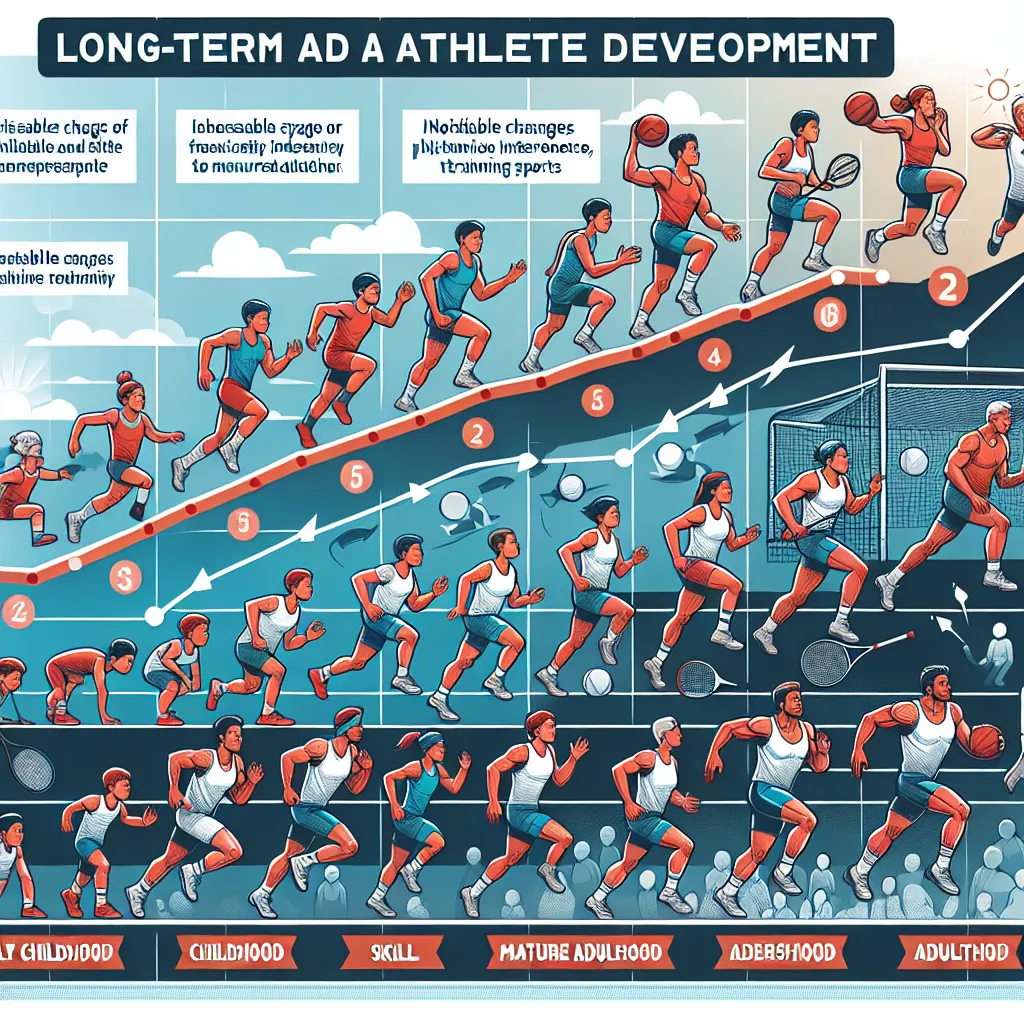Long-term athlete development (LTAD) is a crucial concept in sports science and coaching. As an IELTS candidate, understanding this term and its related vocabulary can significantly enhance your performance in the test, especially in the Speaking and Writing sections. Let’s dive deep into this topic and explore how you can effectively use this terminology in your IELTS preparation.
Understanding the Term
Long-term athlete development (LTAD)
- Definition: A systematic approach to optimizing an athlete’s potential over an extended period, typically from childhood through adulthood.
- Part of speech: Noun phrase
- Pronunciation: /lɒŋ tɜːm ˈæθliːt dɪˈveləpmənt/

Context and Usage
Examples in Context
-
The coach emphasized the importance of long-term athlete development in nurturing young talents.
Analysis: This sentence demonstrates how LTAD is used in a coaching context, highlighting its significance in youth sports. -
Research shows that long-term athlete development programs lead to better performance and reduced injury rates.
Analysis: Here, LTAD is presented in a research context, linking it to positive outcomes in sports performance and athlete health. -
The national sports federation has adopted a long-term athlete development model to guide their training programs.
Analysis: This example illustrates how LTAD is implemented at an organizational level, influencing policy and program design. -
Critics argue that some long-term athlete development approaches may limit early specialization in certain sports.
Analysis: This sentence presents a critical perspective on LTAD, showing that the concept can be debated in sports science circles. -
The seminar focused on integrating long-term athlete development principles into school physical education curricula.
Analysis: This example demonstrates how LTAD concepts can be applied beyond professional sports, extending to educational settings.
Common Contexts
LTAD is frequently encountered in discussions about:
- Sports coaching and training methodologies
- Youth sports development
- Sports policy and administration
- Physical education and school sports programs
- Sports science and research
IELTS Frequency
In IELTS, LTAD and related concepts are most likely to appear in:
- Reading passages on sports science or education
- Writing Task 2 essays on topics related to youth development or sports
- Speaking Part 3 discussions about sports, education, or child development
Vocabulary Analysis
Word Structure
- Long-term: Adjective compound (long + term)
- Athlete: Noun
- Development: Noun (develop + ment)
Synonyms and Antonyms
-
Synonyms:
-
Athlete development pathway
- Definition: A structured approach to developing sporting talent over time
- Part of speech: Noun phrase
- Pronunciation: /ˈæθliːt dɪˈveləpmənt ˈpɑːθweɪ/
-
Sports talent nurturing
- Definition: The process of fostering and cultivating athletic abilities
- Part of speech: Noun phrase
- Pronunciation: /spɔːts ˈtælənt ˈnɜːtʃərɪŋ/
-
-
Antonyms:
-
Short-term performance focus
- Definition: Emphasis on immediate results rather than long-term development
- Part of speech: Noun phrase
- Pronunciation: /ʃɔːt tɜːm pəˈfɔːməns ˈfəʊkəs/
-
Early sport specialization
- Definition: The practice of focusing on a single sport from a young age
- Part of speech: Noun phrase
- Pronunciation: /ˈɜːli spɔːt ˌspeʃəlaɪˈzeɪʃən/
-
Memory Techniques
Mind Map
Create a mind map with “Long-term Athlete Development” at the center, branching out to key components such as:
- Stages (e.g., FUNdamentals, Train to Train, Train to Compete)
- Key principles (e.g., age-appropriate training, holistic development)
- Stakeholders (e.g., coaches, parents, athletes)
- Outcomes (e.g., improved performance, reduced burnout)
Storytelling Technique
Imagine a young athlete named Sarah. Her journey from a playful child trying various sports (FUNdamentals stage) to a focused teenager honing her skills (Train to Train stage), and finally to a competitive adult athlete (Train to Compete stage) embodies the essence of long-term athlete development. This narrative can help you remember the progressive nature of LTAD.
Practice Exercises
Writing Task
Write a paragraph discussing the benefits of implementing long-term athlete development programs in schools. Use at least three related terms from the mind map you created.
Sample answer:
Implementing long-term athlete development programs in schools offers numerous advantages. Firstly, it ensures that physical education follows age-appropriate training principles, allowing children to develop a broad base of skills during the FUNdamentals stage. This approach not only improves overall athleticism but also reduces the risk of burnout associated with early sport specialization. Moreover, LTAD programs promote holistic development, considering not just physical skills but also mental, emotional, and social aspects of growth. By involving key stakeholders such as teachers, parents, and coaches, schools can create a supportive environment that nurtures young athletes through each developmental stage, from basic movement skills to sport-specific training.
Speaking Practice
Imagine you’re discussing sports development in your country during IELTS Speaking Part 3. Practice explaining the concept of LTAD and its potential benefits using simple terms.
Key points to cover:
- Definition of LTAD
- Stages of development
- Benefits for young athletes
- Potential challenges in implementation
Conclusion
Mastering the concept of long-term athlete development and its associated vocabulary can significantly enhance your performance in the IELTS test, particularly in tasks related to sports, education, and youth development. By understanding the context, analyzing the vocabulary, and practicing its use in writing and speaking, you’ll be well-prepared to tackle this topic confidently.
Remember, the key to retaining this knowledge is regular practice and application. Try to incorporate these terms into your daily English use, whether in conversations about sports or in your IELTS preparation exercises. Don’t hesitate to share your experiences or ask questions about using this vocabulary in the comments section below. Keep practicing, and you’ll see improvement in your IELTS performance!